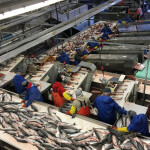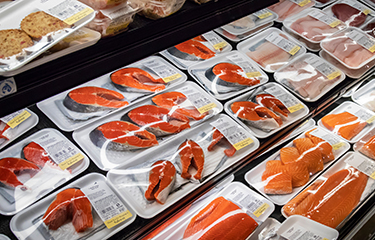In its third annual report, SeaChoice said it “found little to celebrate” in terms of the progress being made by major Canadian retailers’ in the pursuit of their sustainable seafood commitments.
Canada’s leading retailers made just a 3.3 percent improvement across all 21 key performance indicators from August 2019 to July 2020, the report found. According to SeaChoice, the impacts of COVID-19 were partially – but not solely – to blame.
“COVID-19 disrupted food supplies and left grocers scrambling to keep shelves stocked; however, this report includes the eight months prior to COVID lockdowns. When a company makes a commitment, customers expect it to follow through,” SeaChoice National Manager Liane Veitch said in a press release. “It’s important to ensure sustainable fishing practices but also to protect seafood workers from abusive practices.”
Retailers assessed in the latest report include Buy-Low Foods, Cosco Canada, Co-op, Loblaws, METRO, Save-On-Foods, Sobeys, and Walmart Canada.
Featured on Seafood Progress, a web-based platform intended to help consumers assess the performance of grocery stores as it relates to respective sustainable seafood commitments, the report noted that some positive advances have been made by top Canadian retailers in the realm over the past year. These include Co-op’s proactive approach to improving the labeling of its seafood products and METRO’s expansion of its traceability program to include sushi. Sobeys and Walmart Canada also showed improvement, with the retailers now disclosing how much of their fresh and frozen products meet their commitments, SeaChoice said. Greater transparency from some retailers was also highlighed.
There’s still a lot of progress to be made, according to the report, which cited a series of “bad” and “ugly” turns seen by the sector. Among the “bad” items marked by SeaChoice within the report were the zero logged improvements for Costco Canada and Save-On-Foods, and the decreased social responsibility scores for Co-op and Save-On-Foods for not developing clear requirements for suppliers and not carrying out planned initiatives, respectively.
As for the “ugly,” Costco Canada emerged as the only retailer not disclosing any information about its performance against its commitment, SeaChoice said. What’s more, “only two of the eight grocers profiled include all shelf-stable products, like canned tuna, in their sustainable seafood commitments,” the organization added.
“Retailers’ sustainability commitments should cover all the seafood products they sell, not just those that are easiest or most convenient,” Scott Wallace, a senior research scientist with the David Suzuki Foundation and a SeaChoice steering committee member, said. “As we start to look to pandemic recovery, a renewed focus on sustainable and responsible business practices is essential.”
As a “new normal” takes hold, with Canada and the world adjusting to the demands of the COVID-19 pandemic, seafood sourcing policies must remain firm and clear, the report stated.
“While it has undoubtedly been an unusual year for everyone in Canada, as we start to settle into a new ‘business as usual,’ we need to make sure it’s a fairer, more resilient and more transparent world than it was before – and this includes retailers and their seafood sourcing policies,” SeaChoice said.
For retailers, SeaChoice listed the following action steps to take moving forward:
- Reviewing their social responsibility practices and due diligence, and using tools like the Roadmap for Improving Seafood Ethics to help guide their way.
- Expanding the scope of their seafood commitment or policy, making sure they cover all the seafood sold in all their stores.
- Ensuring that they are monitoring and evaluating their efforts to meet the goals they have set for themselves and communicating these to their customers.
“These steps will help retailers drive real change down the supply chain to improve the many sources of seafood that are not certified, not recommended, or completely unassessed,” the organization explained.
Seafood Progress assesses retailer sustainable seafood commitments against 21 KPI’s that reflect the six steps of the Common Vision for Sustainable Seafood, a document it says outlines “steps businesses should take to develop robust sustainable seafood commitments and programs.”
Photo courtesy of Stefan Malloch/Shutterstock







